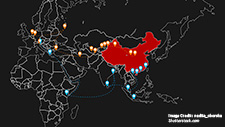Pakistan’s Crisis: Incremental Steps toward Sustainable Democracy
Ingolf Kiesow, Niklas Norling, Niklas Swanström and Svante E. Cornell
Related Publications
-
ISDP Annual Report 2023
ISDP’s Annual Report for the year 2023. We look back on 2023, a year in which tensions and conflicts captured the strategic space in ISDP’s focus areas, making headlines around […]
-
China in Eurasia: Revisiting BRI amidst the Russia-Ukraine Crisis
This paper discusses China’s trade and connectivity plans under the Belt and Road Initiative (BRI) in the Eurasian region and the impact of the Russian invasion of Ukraine on Chinese […]
-
India-Sweden Strategic Compass, Vol.3, No.5, September-October 2024
The year 2024 has been thus far remarkable for India’s global engagement, with significant strides in diplomacy, technology, and sports. Prime Minister Modi’s visit to the United States highlighted deepening […]
-
First Stockholm Forum on Himalaya calls for Greater Collaboration between India, the EU & the US
China’s role as a revisionist power in the region needs to be addressed Urgency of tackling both environmental and geopolitical issues in the Himalayas October 17, 2024: The first-ever Stockholm […]
-
Navigating the Indo-Pacific: How Australia and the EU Can Partner for Peace, Stability, and Prosperity
To navigate the choppy waters of the Indo-Pacific, the EU and Australia must be on the same wavelength regarding shared interests in rules, values, and an open and liberal economic […]




